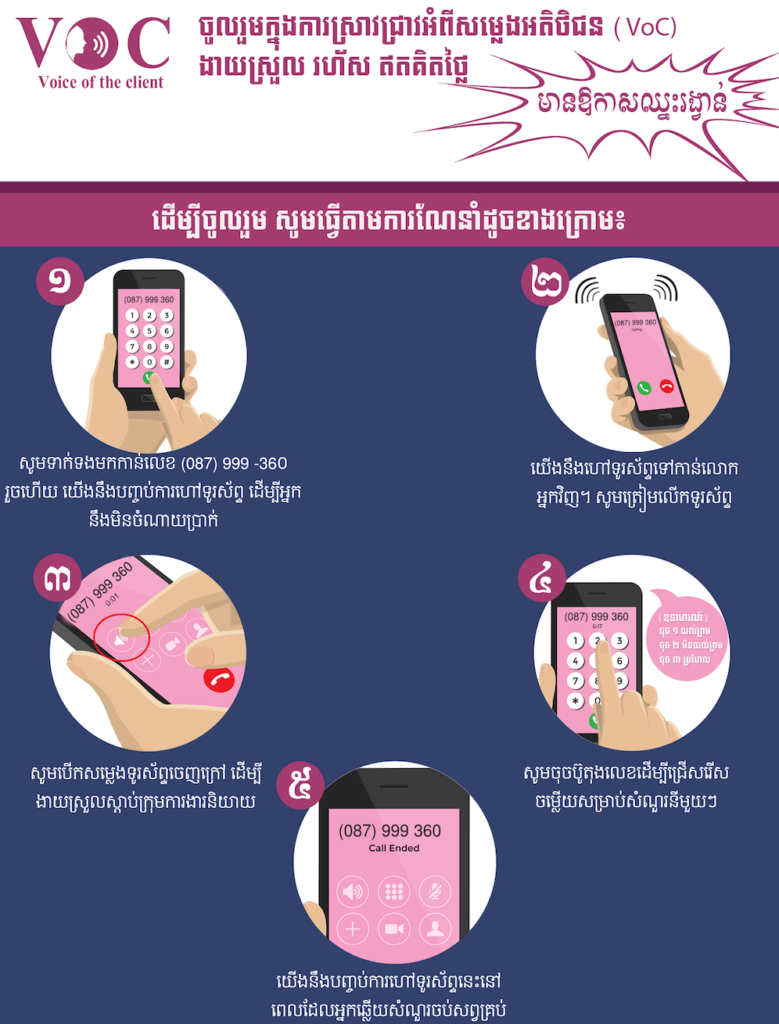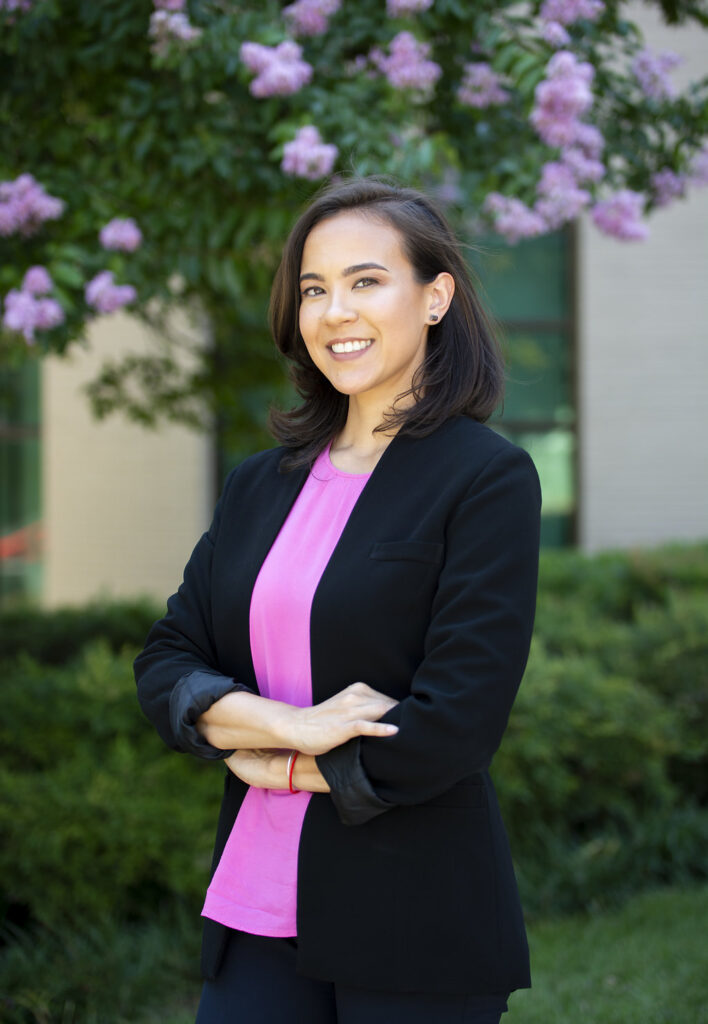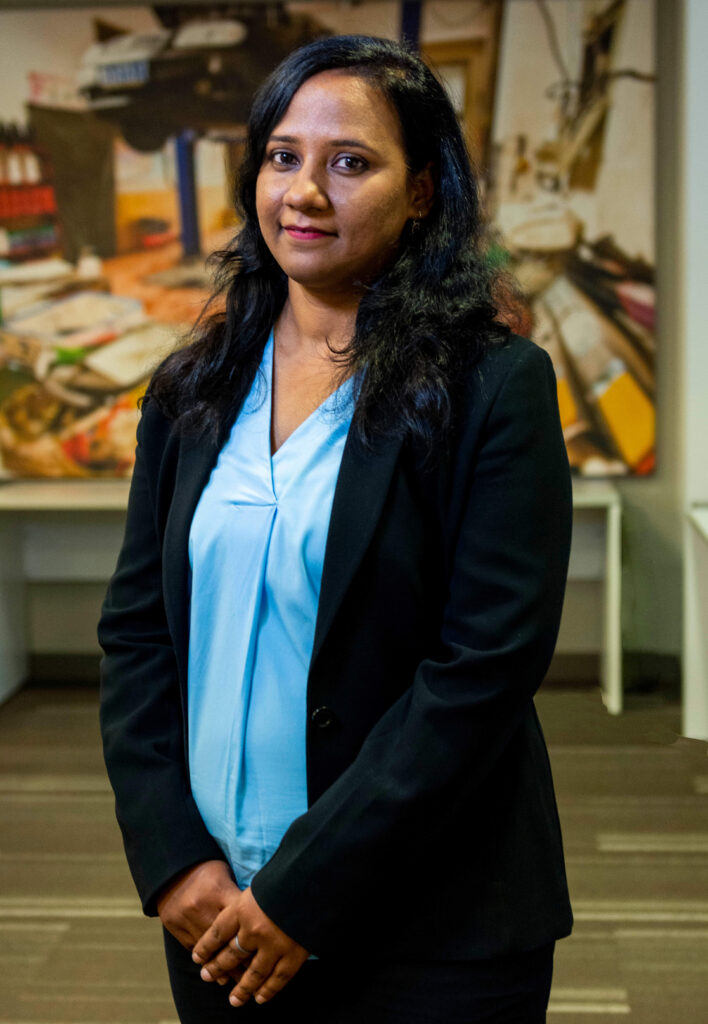
The Cambodian microfinance sector has undergone significant changes in recent years. Many of these changes were implemented in the spirit of improving outcomes for borrowers. For instance, in March 2017, the National Bank of Cambodia imposed an 18 percent interest rate cap on loans provided by microfinance institutions, citing the need to curb high levels of over-indebtedness. However, investors and financial service providers (FSPs) responded by highlighting the inefficiencies of such a cap as a policy tool as it would render operations virtually unsustainable in rural areas.
Largely missing in this dialogue about client protection is the client perspective. This is where FSPs can play a critical role. In doing so, FSPs can demonstrate a clear commitment to the adequate standards of care enshrined in CFI’s Client Protection Principles, even during these challenging times.
CFI launched the Client Voices survey project in Cambodia to explore the suitability of IVR.
With this in mind — and with support from the Mastercard Foundation and in partnership with the Cambodia Microfinance Association — CFI launched the Client Voices survey project in Cambodia to explore the suitability of interactive voice response (IVR) as a cost-effective and scalable solution to more readily understand risks faced by clients (see also the Rwanda Client Voices report, the most recent in the series).
What Is IVR?
IVR is a technology that relies on an automated system to transmit pre-recorded information to callers, who in turn provide their input via the touchscreen or keypad of their mobile phone. For this project, we used Verboice – an open-source IVR platform built by InSTEDD – to deploy a 15-question survey to clients of AMK, HKL, and MAXIMA, three Cambodia-based FSPs.
To understand how IVR works in the context of the Client Voice survey, consider the following vignette:
After a hard day’s work, Leakhena, a client, settles into her chair and picks up her phone to dial the number featured on the brochure she received from her loan officer earlier in the week. On the other end of the line, a recorded voice — named Srey Pov — informs her about the purpose of the survey and prompts Leakhena to disclose her gender. Leakhena presses “1” on her keypad to indicate that she is a woman. She listens and responds to the next 14 questions – such as whether, over the past 12 months, she has had to cut her expenses on necessities such as food and school fees to repay her loan – before Srey Pov bids her farewell. In the span of five to seven minutes, and from the comfort of her home, Leakhena could share feedback on her borrowing experience with the FSP.
This ongoing project is poised to reveal client experiences in Cambodia, and, in the process, has also offered critical insights into how providers can best integrate IVR into their client feedback mechanism.
Insight #1: Don’t Let Jargon Stand Between You and Your Clients
To drive client engagement, it is useful to keep in mind a basic principle of behavioral design: use simple and clear language.
By applying this fundamental to the design of an IVR survey, we can deduce that clients are more likely to respond to a voice that sounds like them. We employ the term “voice” broadly to encompass the various components that may catch the ear of survey respondents. These elements include intonation and speech tempo, and, as we discovered early in the project, semantics.
Our partners took the lead in formulating the questionnaire and hiring local voice talent to record it. Preliminary rounds of cognitive testing revealed that the original version of the questionnaire used jargon for certain words such as “loan officer,” “receipt,” and “complaint” that clearly fell on deaf ears. While these words were assumed to be commonplace in Khmer (the national language of Cambodia), clients would either ask for clarification or skipped the question altogether.
Words such as “loan officer,” “receipt,” and “complaint” fell on deaf ears.
Recognizing that the success of IVR surveys depends on providers adopting the voice that clients use themselves, we replaced the technical survey jargon with vernacular terms before recording a second batch of audio files.
Insight #2: Consider Ways to Defray the Cost Clients Must Bear to Participate
Providing feedback can have considerable cost implications for clients. The average monthly income of farmer households in Cambodia – who constitute a sizeable share of microfinance clients in the country – is approximately $110 USD. While prepaid airtime credit can be purchased for the equivalent of $0.50, clients might view their phone balance – however big or small – as an opportunity cost, especially considering that most of them are stretching their income to cover other essential expenses, such as food, electricity, and school fees.
Understanding that a client’s phone balance can have some bearing on their ability and willingness to participate in a phone-based survey, we programmed the platform to assure clients that would not incur any charges for airtime used while completing the survey. To further incentivize participation, we entered all respondents into a lottery draw for a chance to win airtime credit. Despite these efforts, we quickly observed that waiving airtime charges was not sufficient to guarantee the participation of all clients.
An initial examination of our survey results showed that the volume of in-network calls, i.e. calls between clients subscribed to the same mobile network operator (MNO) as the one through which we secured the dedicated survey phone lines, outnumbered the volume of out-of-network calls. Although there are many reasons an uneven split between in- and out-of-network callers could occur, we suspected that the most likely explanation is that the latter group can initiate a call to an out-of-network number only if a minimum balance is held on their device.
We since have been coordinating with our partner MNO to convert the survey telephone lines into toll-free numbers. Whenever possible, FSPs should look for creative ways to minimize the cost that clients have to bear to share their feedback, even if that cost is as seemingly small as a minimum balance.
Insight #3: Be Prepared to Navigate a Complex Mobile Landscape
A country’s mobile landscape, as well as the diversity in phone specifications, can bring operational hurdles when deploying an IVR survey. For example, SIM card registrations significantly outnumber the country’s population, which makes contacting customers all the more challenging. Also, the majority of phones do not support Khmer script, which can disproportionately affect the user experience of those clients with lower levels of literacy.
In advance of launching Client Voice, the FSP field staff – comprised of loan officers and branch managers – met with and distributed flyers to clients to promote awareness of the survey. During this period, they also had clients confirm whether they had access to a mobile device and, if they owned one, to provide the phone number they most frequently use.
Additional data collected by one FSP further illustrates the complexity of mobile ownership and access. Thirty-nine percent of their clients own a smart phone and 61 percent own an analog device. The same FSP also noted that 73 percent of their clients own a personal phone, 25 percent share a phone within their household, and the remaining 2 percent do not own a phone but have access to one.
Knowing the level of digital literacy and mobile access of clients helped field staff tailor survey-related messaging.
By knowing the level of digital literacy and mobile access of their clients, the field staff were able to better tailor their messaging about the survey. For example, for those clients who were less digitally literate, field staff explained each step with the support of a flyer and gave a live demonstration on how to dial into the survey line. While this degree of hand holding is not always required, it is certainly helpful to ensure the participation of clients who might be otherwise excluded.
An Ideal Method During These Challenging Times
CFI has been thinking a lot about how providers can respond to the COVID-19 pandemic. At the time of writing, the Cambodian government was considering declaring a state of emergency due to the coronavirus. We believe this makes IVR technology even more appealing given social distancing constraints. By using IVR, providers can successfully collect data in real time, at greater scale and lower cost, even in the midst of a global pandemic or other negative externalities that makes traditional survey work difficult.
As for this survey, we look forward to sharing our findings, so we can offer a more complete view of the Cambodian microfinance landscape – one that features client voices – in the coming weeks.











